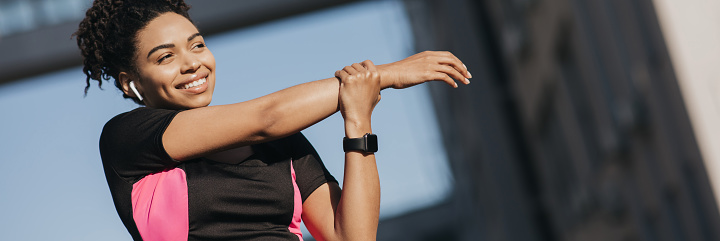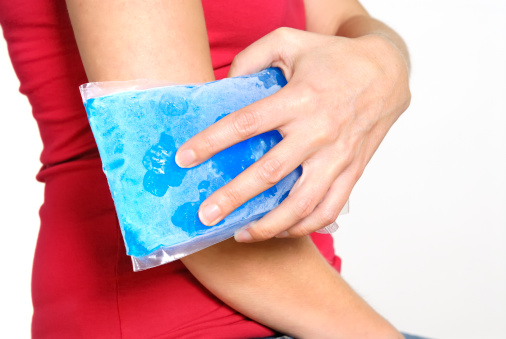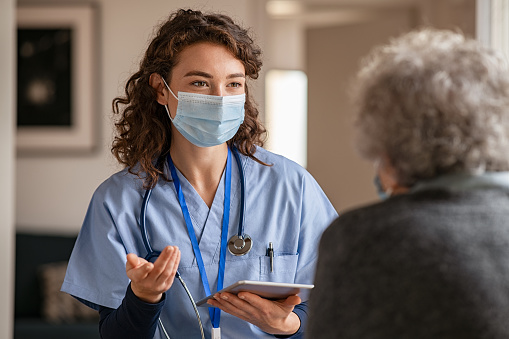
Did you know that your skin is the largest organ in the human body? Did you know that if your skin is healthy, it will protect your body from infection and injury? Yes, the skin has some kind of protection abilities but, what does it mean if you bruise easily?
Bruising might mean there could be something wrong with your circulatory system. This can happen for a variety of reasons, all of which are not always easy to diagnose. To make matters worse, some people who experience this problem don't think about it until they're faced with an increase in bruising or bleeding. It's important to go see a medical professional when this happens so they can figure out what's going on! The sooner you get help, the better!
What is a bruise, and how does it happen?
When you bump your body against something or other force that impacts your skin, microscopic tears sometimes occur in the blood vessels near the surface of the skin. The damage to these thin-walled veins lets them easily break open and bleed into surrounding tissues. When this happens, a small amount of blood seeps out of the thin walls of the vein into nearby tissue, creating that purplish-blue mark under your skin that we call a bruise.
And because the platelets are being destroyed, they can't clot effectively (if you have an underlying disease that is causing your platelet count to drop, or due to chemotherapy, or because you have another health condition which has caused its production to be impaired.)
Why do some individuals bruise more easily than others?
There is no one specific reason why some people bruise more easily than others, but here are a few possibilities:
- Reduced number of platelets in the blood (this can be due to many factors such as chemotherapy treatment of certain diseases like leukemia and lymphoma)
- Impaired production of platelets (a disorder such as Chediak-Higashi Syndrome or May-Hegglin Anomaly)
- Increased fragility of small blood vessels (such as Ehlers-Danlos Syndrome or Lupus Erythematosus)
The most common cause by far for easy bruising is known as fragile skin. This happens because the blood vessels under your skin are easy to rupture if you bump them into something.
Injury to the skin from a burn, cut, or other traumatic events can serve as an entry point for microorganisms like bacteria and lead to a bruise caused by infection. On rare occasions, a person may bruise spontaneously without any injury whatsoever (spontaneous ecchymosis). This happens without any sign of broken blood vessels and is often associated with bleeding disorders.
What are the most common causes of bruises?
Bruising is one of the most common symptoms to arise from a wide variety of medical conditions and can be associated with bleeding disorders. Bruising easily may also indicate an underlying medical problem such as:
- vitamin deficiency (scurvy, vitamin C)
- intestinal disease (inflammatory bowel disease (IBD), irritable bowel syndrome (IBS)
- Kidney failure causing low blood platelets, hemophilia, or blood clotting problems.
- A disease affecting the liver or gallbladder leading to excess bile in the bloodstream.
- Cancer that has spread throughout the body, causing internal bleeding in many different areas.
- If you have an illness that makes it hard for your blood to clot properly, you may bleed more easily when injured and heal slowly from bruises. This can cause repeated bruising or easy bruising along with other symptoms such as nosebleeds.
- Blood thinners are medications that reduce the ability of the blood to clot. They are often prescribed for people with conditions such as deep vein thrombosis, pulmonary embolism, stroke. People who take blood thinners may bruise more quickly because their blood cannot form clots normally to stop bleeding.
- Trauma can also cause secondary hemarthrosis. Hemarthrosis is bleeding into the joint space. Trauma to a joint can cause bleeding into the area. This causes swelling and pain that may last for weeks or months.
- Bruising after immobilization, such as when you have been wearing a cast for longer than four weeks or have had a restricted movement for some time, is normal. This occurs because when you sustain an injury, your body's natural response is to restrict blood flow to the area in order to protect it. However, too much of this can lead to a lack of oxygen and nutrients being sent to these tissues, which can cause tissue damage. This type of chronic bruising is known as Coumadin necrosis after its most common cause, which is a medication called warfarin. It usually happens when a person with a heart condition takes a high amount of warfarin for an extended period due to the thickening effect it has on the blood.
- If you have been taking anti-inflammatory medications such as Ibuprofen or Aspirin long-term, then this may also sometimes lead to chronic bruising, once again because they decrease your body's natural ability to stop bleeding.
It's best for you to consult your doctor if you notice any unexplained bruises, especially if you are elderly or have a chronic medical problem.
How can you tell if your bruising is serious or not?
Bruising usually heals within a week. "Black and blue" colouring around the site of injury is common, especially in cases of minor trauma. A black-and-blue colour indicates bleeding under the skin from small blood vessels called capillaries. When a bruise appears green or yellow, it means that your body has begun to break down hemoglobin in the blood released from ruptured red blood cells due to extravasation.
Treat it as serious bruising if:
- you have minor fractures or sprains that can result in serious bruising if the skin isn't broken. Muscle injuries deeper within the body may also cause discolouration of the skin without any obvious signs of skin damage.
- You are elderly, be aware that weak bones may break with little force and lead to severe bruises. Chronic diseases such as arthritis, kidney failure, or kidney disease can also increase your risk for excessive bruising because they affect blood clotting and make it difficult for small vessels to repair themselves after injury.
- The bruise takes too long to heal, or new bruises appear unrelated to any injury.
- You have a disorder called thrombocytopenia that affects the normal clotting of blood; you may bruise easily from even mild injury.
Important Reminder!
It's important to consult a medical professional and take note of your body's other symptoms (such as fever, chills, coughing). If your bruise worsens over time or has an unusual colouring (black or blue, yellow or green), it could be a sign of illness.
What does this mean?
If you have an autoimmune disease, take note of your bruising so that your doctor can better understand how to treat you and help reduce your symptoms. Do not rely on this article alone but instead, go straight to your family doctor.
How to prevent future bruising injuries?
Everyone has experienced the pain of a bruise. No matter how trivial or severe, it can be frustrating and painful to deal with. While there is no way to avoid bruises completely, we have found some ways you can prevent future bruising injuries. Read on for more information!
Stretch before exercising
Stretching increases blood flow through the body, including crucial capillaries under the skin. It is important to stretch so that you will be prepared for strenuous exercises such as running or weightlifting. Stretch lightly and do not push yourself too hard; this could lead to strained muscles, resulting in bruises.
Use a foam mat when doing yoga or exercising.
Muscle stiffness often leads to muscle pain, which can then cause bruising if done incorrectly during physical activity. This is especially common in hard-working muscles like the hamstrings and buttocks. Padding a hard floor surface with a foam mat can help to reduce this kind of bruising, but there are several other exercises that you may consider less painful instead.
Exercise
Exercise is another excellent way to reduce bruising because it encourages strong, healthy circulation rich in oxygen and nutrients throughout the body.
Choose the right clothing and shoes when exercising.
There are two ways in which wearing tight-fitting clothes can cause you to bruise easily: compression and chafing. Compression is only an issue if your clothing is so tight as to restrict your circulation; because blood needs to properly flow through your veins for muscle stiffness and bruising prevention, avoid this type of problem by choosing soft, flexible fabrics and looser fits. Chafing occurs when fabric rubs against the skin repeatedly during movement; wear loose clothing made from breathable material such as cotton or silk and reduce chafing by choosing smooth fabrics like polyester and nylon whenever possible.
If you're going to be active, it's a good idea to wear clothing that allows for freedom of movement; tight-fitting clothes may be stylish, but they're not very practical when it comes to preventing injury!
Many of us are active rather than sedentary, so it's no surprise that the risk of injury is increased; always be prepared for accidents by wearing protective clothing like seat belts and bike helmets whenever possible and carry first aid kits with you on long walks/cycle rides etc. Wear shoes with proper support too!
Avoid areas that are accident-prone.
This includes an open flame area, kitchen, stairs etc. Be extra careful when stepping in or out of the tub too, even if the surface looks dry, it may be slippery!
Take care of your skin.
Don't scratch or pick at it and try to avoid contact with harsh chemicals that may irritate the skin.
Use handrails, grip mats, and non-slip mats
If you usually get dizzy, prone to tripping over, or have poor balance, it is best to have someone install handrails and set up non-slip mats in the house.
Get enough sleep
It may seem like an obvious one, but it really can't be stressed enough. If you are tired, your body won't have the energy to repair itself, and thus, bruises will be more likely to occur.
Be careful when shaving.
Don't stretch or pull your skin when you shave; make sure there is enough cream on the skin when you shave so that the razor glides over the skin.
Avoid narrow, cluttered surroundings or furniture.
If you usually bump into things or find it hard to squeeze past shelves and counter-tops because they're too close together, avoiding them is a must. Also, if your house is cluttered with lots of objects that tend to fall over easily, go around your home and make sure that everything is in its rightful place.
Wear non-slip footwear
We all like nice-looking footwear like slip-ons or shoes with fur or lace and sequins but, be sure that you are not compromising your safety when wearing them. Laces get tangled, and sequins that fall from the shoes can cause slips and falls. It is best to wear sturdy flats or wedges that will keep you on your feet wherever you go.
If necessary, get protective pads.
If you find that you bruise very easily, it might be a good idea to invest in protective clothing like helmets and knee/elbow pads; some people do bruise very easily due to health conditions, so consult your doctor if you're concerned about this issue.
Always be careful
This might seem implied, but it's worth saying to be extra careful. Running, cycling, or any strenuous activity can easily lead to bruising injuries if you're not careful. Try running with a friend who'll be able to call for help should something happen, and ensure that your equipment is in good condition before starting out on any new activities.
Ways to treat bruises once they've already happened?
Ever wonder what will make bruises heal faster? Here are some tips on how to get rid of those pesky bruises or other injuries as soon as possible!
Apply ice packs for 20 minutes at a time, four times per day
For the first two days, apply ice compress on your bruises for 20 minutes every 2 hours. After the first 48 hours, you can decrease the time to 20 minutes every 4 hours as long as there's no lasting pain or discomfort.
Drink lots of water
Drink lots of water to work on rebuilding what's damaged in your body. Don't go overboard here, though! Too much water can lead to other harmful problems, so keep an eye on your intake!
Get plenty of sleep.
This is especially important for things like bruises which usually happen when you're moving around a lot and using energy. When you aren't able to rest properly, it makes it difficult for your body to fix itself up after damage, making it harder for you to heal over time. Take naps if need be!
Do not go beyond your limits.
You don't want to add any more stress than necessary during these times; try not exercising or pushing yourself too hard when you're trying to recover from something like a bruise. If you need to, take it easy!
Moisturize, moisturize, moisturize
Keeping your skin hydrated will reduce the amount of damage dryness can cause to capillaries and small blood vessels below the surface of the skin. Look for a lotion with Shea Butter or Cocoa Butter as they contain antioxidants that can prevent damage caused by free radicals.
Use sunscreen
UV exposure is one of the most common causes of skin bruising, so if you have a lot of sun exposure, wear sunscreen! Sunburns are very common with bruises, so it's important you protect yourself.
Sunscreen also helps keep your skin moisturized and reduces the risk of developing wrinkles down the road, so its benefits are many.
Practice good hygiene
Obviously, the biggest thing is to try to avoid any additional injuries during this time, but there are some other things you can do as well. Wash your hands regularly, which will help prevent the spread of infections that may be happening after an injury.
Avoid alcohol consumption.
If you're already hungover, it's even worse for your body because it cannot run at full speed while trying to heal itself. Alcoholic beverages may also be too dehydrating, so it's important to drink lots of water while recovering from any injuries or accidents.
Take a multivitamins
Take a multivitamin daily to ensure that you get an adequate amount of essential minerals in your diet like calcium, magnesium and potassium, which all play vital roles in the healing process.
Try a bruise-healing diet.
Ever wonder what food can make bruises heal faster? Or what food can not? Well, here's what you should do:
Increase Vitamin E in your diet. This can be done by eating more whole grains, nuts and sunflower seeds (which are also high in zinc). It's important to note that you should not take Vitamin E supplements without first asking your primary care physician. Vitamin E supplements can be especially dangerous for patients currently taking blood-thinning medications.
Avoid foods high in Vitamin K while you have bruises on your skin. This is because Vitamin K can interfere with blood clotting, which slows down the healing process. Since these types of foods are found in green leafy vegetables like kale, broccoli and spinach - it would probably be best to stay away from them while you.
Eat foods high in Vitamin C to aid in the growth of new cells and tissues. Some great sources are oranges, grapefruit, strawberries, green peppers and broccoli. Vitamin C can help with bruising because the body uses it as a co-factor in the production of collagen. Collagen is what gives skin its elasticity and strength; it's also what heals wounds and forms scars.
Avoid junk foods, especially processed meats like hot dogs, which contain nitrates. Nitrates act as a blood thinner preventing the blood from clotting when an injury occurs. Junk foods also contain low amounts of Vitamin C and essential minerals.
Eat lots of fresh fruit and vegetables because they contain many antioxidants which fight free radicals in the body, which cause tissue damage leading to bruising. Some great antioxidant sources are strawberries, raspberries, blueberries, acai berries, red grapes and apricots.
Before changing your diet, be sure you consult your doctor, especially if you are taking blood-thinning medications.
Avoid caffeine
Avoid caffeine, which is proven to slow the healing process of bruises. Caffeine can make bruises last even longer by interfering with collagen production, which is an important part of the process. This means no coffee, tea, or energy drinks! However, if you're experiencing caffeine withdrawal due to your serious addiction, try drinking chamomile tea instead!
Consult with your family physician
Bruising easily is often a sign of something else going on in your body, so make sure you catch any potential problems early. If bruising is accompanied by other symptoms like fatigue or pale skin, go see a doctor immediately! Even if they don't "find anything", make sure they at least check for things like anemia or vitamin deficiencies that could be responsible for these symptoms. It's better to play it safe than sorry!
Take care of yourself.
If you're particularly accident-prone or are getting bruised more often, make sure that you take care of yourself and your body.
Always, always consult with your doctor!
If you bruise easily, it's possible that your blood vessels are more fragile than usual. This can be due to a number of things like genetics and lifestyle habits such as smoking or drinking excessively.
Exercise and a healthy, balanced diet can do wonders for your body – but like we always say, if you notice unusual bruising or changes in your body, always consult with your physician. Our blog is for information purposes only and shouldn't be used to self-diagnose your health conditions. For all of your medical needs, please make an appointment with your doctor or primary care physician.









